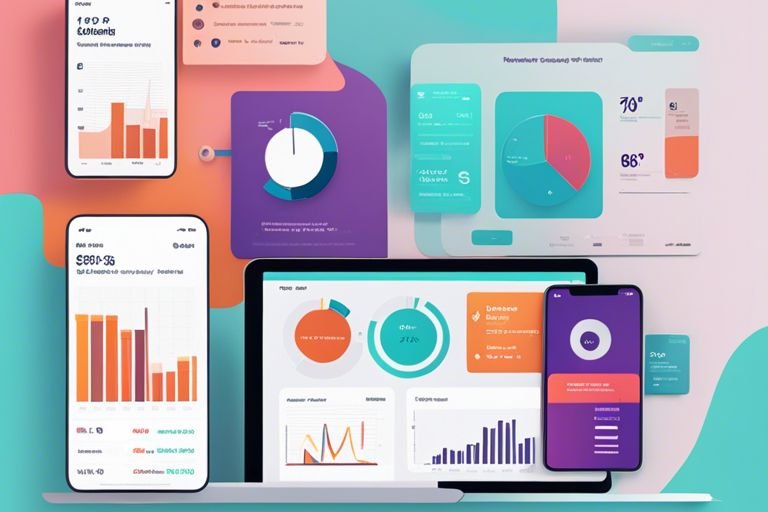Data-Driven marketing has revolutionized the way businesses reach and engage with their target audience. In today’s digitally driven world, the power of data cannot be underestimated. Our expert guide will navigate you through the ins and outs of leveraging data-driven strategies to achieve marketing success. From identifying key metrics to analyzing customer behavior, we will equip you with the tools and knowledge needed to make informed decisions and drive results. Stay ahead of the competition and harness the full potential of data-driven marketing with our comprehensive guide.
Key Takeaways:
- Data-driven marketing is vital for businesses to make informed decisions based on customer insights and behaviors.
- Utilizing customer data allows businesses to personalize marketing strategies and campaigns for targeted audiences, leading to higher engagement and conversion rates.
- Implementing data analytics tools and technologies helps businesses track, measure, and optimize marketing efforts to drive growth and ROI.
Understanding Data-Driven Marketing
Types of Data Utilized in Marketing
You, as a marketer, need to understand the different types of data that can be utilized to achieve marketing success. From customer demographics and purchase history to website interactions and social media engagement, data plays a crucial role in understanding consumer behavior and tailoring marketing strategies accordingly. Recognizing the significance of utilizing first-party data and combining it with third-party data allows for a more comprehensive view of your target audience.
| First-Party Data | Customer Purchase History |
| Third-Party Data | Social Media Engagement Metrics |
| Website Interaction Data | Customer Demographics |
| CRM Data | Email Engagement Patterns |
| Behavioral Data | Mobile App Interactions |
The Evolution of Data-Driven Strategies
Understanding the evolution of data-driven strategies is crucial for marketers in today’s digital landscape. Utilized effectively, data-driven strategies have the power to revolutionize marketing efforts, driving more personalized and targeted campaigns. By leveraging advanced analytics and machine learning algorithms, businesses can gain valuable insights into consumer preferences and behavior, allowing for real-time adjustments to marketing tactics.
Building a Data-Driven Framework
Step-by-Step Guide to Implementing Data Analytics
Some organizations may struggle with implementing data analytics effectively. To help streamline the process, it’s important to break down the implementation into specific steps. Below is a table outlining a step-by-step guide to implementing data analytics in your marketing strategy:
| Step | Description |
| 1 | Define your business goals and KPIs |
| 2 | Identify relevant data sources |
| 3 | Implement data collection tools |
| 4 | Analyze and interpret data |
| 5 | Optimize marketing strategies based on insights |
Factors Affecting the Success of Data-Driven Marketing
Some key factors can significantly impact the success of data-driven marketing efforts. These factors should be carefully considered and optimized for best results. Below are some critical factors to keep in mind:
- Data Quality: Ensuring data accuracy and relevance is crucial for making informed decisions.
- Tools and Technology: Utilizing the right tools and technology can streamline data analysis and interpretation.
- Team Expertise: Having a team with the necessary data analytics skills is necessary for successful implementation.
More about Factors Affecting the Success of Data-Driven Marketing
If data quality, tools and technology, and team expertise are not optimized, the effectiveness of data-driven marketing strategies can be compromised. It is imperative to invest time and resources in these areas to maximize the impact of data-driven initiatives. Any shortcuts or negligence in these aspects can lead to subpar results in marketing campaigns.

Maximizing Marketing Efforts
Tips for Optimizing Data-Driven Campaigns
Not all data-driven marketing campaigns are created equal. To ensure success, follow these tips for optimizing your data-driven campaigns:
- Define clear objectives for your campaign before plunging into data analysis.
- Use segmentation and personalization to target specific audience groups effectively.
- Regularly monitor and analyze key performance indicators to adjust strategies for better results.
- Integrate data from multiple sources for a comprehensive view of your target audience.
- Test different approaches to find the most effective marketing tactics.
Recognizing the importance of data quality and staying updated with the latest technologies is crucial for maximizing the impact of your data-driven marketing efforts.
Pros and Cons of Data-Driven Marketing Approaches
Some pros and cons of data-driven marketing approaches are outlined below:
| Pros | Cons |
| Effective targeting | Privacy concerns |
| Personalization | Data security risks |
| Measurable results | Overreliance on data |
| Improved ROI | Complexity in data analysis |
| Real-time optimization | Cost of data tools |
Data-driven marketing offers the potential to significantly enhance marketing strategies, but it is imperative to carefully weigh the advantages and disadvantages before fully integrating these approaches into your campaigns.
Measuring Success in Data-Driven Marketing
Despite the rapid evolution of data-driven marketing strategies, success in this field can be measured effectively through a combination of key performance indicators (KPIs) and metrics. To stay ahead in the game, it is crucial for marketers to stay updated with 5 Data-Driven Marketing Trends For 2022 and adapt their measurement techniques accordingly.
Key Performance Indicators (KPIs) and Metrics
While implementing data-driven marketing campaigns, marketers need to establish relevant KPIs and metrics to track the success of their strategies. These measurements help in evaluating the performance of campaigns, understanding customer behavior, and optimizing marketing efforts for better results. By focusing on conversion rates, customer acquisition costs, return on investment (ROI), and other critical metrics, marketers can make informed decisions that drive business growth.
Continual Improvement Through Data Analysis
Marketing success hinges on continual improvement through data analysis. By analyzing marketing data regularly, businesses can uncover valuable insights into customer preferences, campaign performance, and market trends. This data-driven approach enables marketers to identify opportunities for optimization, potential risks, and areas for innovation, leading to more effective marketing strategies and improved results.
Understanding the impact of data-driven insights is crucial for long-term success in marketing. By leveraging data to drive decision-making, marketers can create targeted campaigns, enhance customer experiences, and achieve sustainable business growth in today’s competitive landscape.
Conclusion
So, AR TechPartner’s Expert Guide To Data-Driven Marketing Success provides a comprehensive roadmap for organizations looking to harness the power of data in their marketing strategies. By leveraging data analytics, companies can make informed decisions, personalize their marketing efforts, and ultimately drive more successful campaigns. Embracing data-driven marketing is no longer a choice but a necessity in today’s highly competitive digital landscape. With the right tools and strategies in place, businesses can unlock valuable insights, optimize their marketing ROI, and stay ahead of the curve. AR TechPartner’s guide equips marketers with the knowledge and resources needed to succeed in this data-driven era, setting them up for long-term success and growth.
FAQ
Q: What is data-driven marketing?
A: Data-driven marketing is a strategy that utilizes customer data and insights to make informed decisions about marketing campaigns and initiatives. By analyzing and interpreting data, businesses can personalize their marketing efforts, target the right audience, and optimize their marketing ROI.
Q: Why is data-driven marketing important?
A: Data-driven marketing is important because it allows businesses to have a deeper understanding of their customers, their behavior, and preferences. By leveraging data, businesses can create more personalized and targeted marketing campaigns that are more likely to resonate with their target audience, leading to higher conversion rates and better overall marketing performance.
How can businesses implement a successful data-driven marketing strategy?
A successful data-driven marketing strategy requires businesses to collect relevant data, analyze it effectively, and use the insights gained to inform marketing decisions. This involves setting clear goals, leveraging the right tools and technologies for data analysis, and continuously testing and optimizing marketing campaigns based on data-driven insights.



